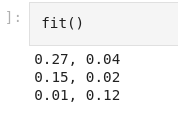I got this error when trying nbdev.nbdev_export() :
InterpolationMissingOptionError Traceback (most recent call last)
Cell In[60], line 1
----> 1 import nbdev; nbdev.nbdev_export()
File ~\AppData\Local\Programs\Python\Python311\Lib\site-packages\fastcore\script.py:110, in call_parse.._f(*args, **kwargs)
107 @wraps(func)
108 def _f(*args, **kwargs):
109 mod = inspect.getmodule(inspect.currentframe().f_back)
→ 110 if not mod: return func(*args, **kwargs)
111 if not SCRIPT_INFO.func and mod.name==“main”: SCRIPT_INFO.func = func.name
112 if len(sys.argv)>1 and sys.argv[1]==‘’: sys.argv.pop(1)
File ~\AppData\Local\Programs\Python\Python311\Lib\site-packages\nbdev\doclinks.py:140, in nbdev_export(path, **kwargs)
138 for f in files: nb_export(f)
139 add_init(get_config().lib_path)
→ 140 _build_modidx()
File ~\AppData\Local\Programs\Python\Python311\Lib\site-packages\nbdev\doclinks.py:98, in build_modidx(dest, nbs_path, skip_exists)
96 if idxfile.exists(): res = exec_local(idxfile.read_text(), ‘d’)
97 else: res = dict(syms={}, settings={})
—> 98 res[‘settings’] = {k:v for k,v in get_config().d.items()
99 if k in (‘doc_host’,‘doc_baseurl’,‘lib_path’,‘git_url’,‘branch’)}
100 code_root = dest.parent.resolve()
101 for file in globtastic(dest, file_glob=“*.py”, skip_file_re='^', skip_folder_re=“.ipynb_checkpoints”):
File ~\AppData\Local\Programs\Python\Python311\Lib\site-packages\nbdev\doclinks.py:98, in (.0)
96 if idxfile.exists(): res = exec_local(idxfile.read_text(), ‘d’)
97 else: res = dict(syms={}, settings={})
—> 98 res[‘settings’] = {k:v for k,v in get_config().d.items()
99 if k in (‘doc_host’,‘doc_baseurl’,‘lib_path’,‘git_url’,‘branch’)}
100 code_root = dest.parent.resolve()
101 for file in globtastic(dest, file_glob=“*.py”, skip_file_re=‘^_’, skip_folder_re=“.ipynb_checkpoints”):
File :861, in iter(self)
File ~\AppData\Local\Programs\Python\Python311\Lib\configparser.py:1274, in SectionProxy.getitem(self, key)
1272 if not self._parser.has_option(self._name, key):
1273 raise KeyError(key)
→ 1274 return self._parser.get(self._name, key)
File ~\AppData\Local\Programs\Python\Python311\Lib\configparser.py:815, in RawConfigParser.get(self, section, option, raw, vars, fallback)
813 return value
814 else:
→ 815 return self._interpolation.before_get(self, section, option, value,
816 d)
File ~\AppData\Local\Programs\Python\Python311\Lib\configparser.py:396, in BasicInterpolation.before_get(self, parser, section, option, value, defaults)
394 def before_get(self, parser, section, option, value, defaults):
395 L = []
→ 396 self._interpolate_some(parser, option, L, value, section, defaults, 1)
397 return ‘’.join(L)
File ~\AppData\Local\Programs\Python\Python311\Lib\configparser.py:435, in BasicInterpolation._interpolate_some(self, parser, option, accum, rest, section, map, depth)
433 v = map[var]
434 except KeyError:
→ 435 raise InterpolationMissingOptionError(
436 option, section, rawval, var) from None
437 if “%” in v:
438 self._interpolate_some(parser, option, accum, v,
439 section, map, depth + 1)
InterpolationMissingOptionError: Bad value substitution: option ‘lib_name’ in section ‘DEFAULT’ contains an interpolation key ‘repo’ which is not a valid option name. Raw value: ‘%(repo)s’
I got stuck for 2 day  can anyone help me?thanks
can anyone help me?thanks

